Performing Crosstalk, in a Cross-Cultural Way

Tina Huang, who is half Chinese and half Russian, has been living in Beijing since she was 5 years old. She speaks fluent Chinese, Russian and English. By chance, she met crosstalk performer Yan Jiabao in 2014. She eventually began performing crosstalk with him. They combine Chinese and Western cultures in their performances, as they want their audiences to experience the collision and integration of different cultures.
"Beijing is home to me," Huang says. "Beijing, as capital of China, is inclusive and diverse. It is full of elegance, but also it is a vibrant city. It is elegant, because of its history, and it is full of vitality, because Beijingers have a rock spirit in their bones. Beijing, like all cities, needs you to spend time to appreciate its charm."
Huang fell in love with crosstalk at a very young age. "Every Chinese person knows crosstalk. It is a very popular performance art in China. It is funny, and it has its own taste of humor," she says.
Crosstalk is a traditional form of comic dialogue that dates back to the Ming (1368-1644) and Qing (1616-1911) dynasties. Crosstalk is usually performed by two people, but sometimes by one person or even a group of people. Crosstalk draws on every aspect of Chinese culture, from history and folk tales to contemporary social issues. Although there are hundreds of skits in the traditional repertoire, they are usually edited to suit the times, and the audiences.
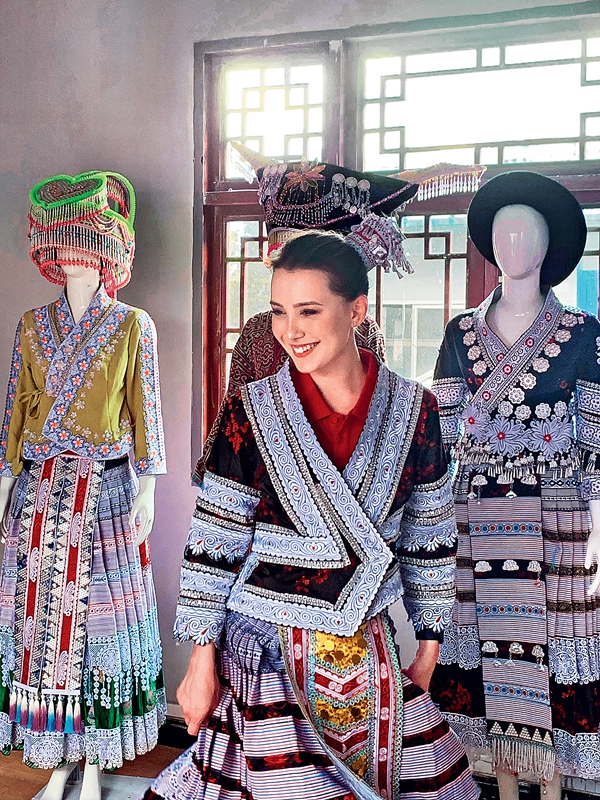
During an interview with Women of China, Huang shared her understanding of crosstalk, and her experiences while performing crosstalk in China. The following is that interview, in question-and-answer format:
Women of China (WOC): How did you meet your partner, Yan Jiabao, and begin learning and performing crosstalk? What was your original intention when you became a crosstalk performer?
Huang: My learning experience started the moment I met Yan. I first met him in 2014. At that time, we were recording a show on Beijing Television Station (BTV), and our dressing rooms were next to each other. He heard the lively laughter coming from my room.
When he passed my room, he saw the person who was speaking was me. He was very surprised, because he didn't expect the Chinese he heard was being spoken by a foreigner.
Then, he introduced himself, and he asked me if I would be interested in joining him during the next show, performing crosstalk. I thought I was studying hosting, and crosstalk would also help me in the TV industry, so why not try it? Then, we started rehearsing, and he taught me how to get started. Within two months, we had our first performance, at the BTV Lantern Festival Gala. Eight years have passed, and we are still partners.
There is one more reason why I do crosstalk — I want Chinese people and foreigners to see that Chinese culture and Western culture have many characteristics in common. A lot of Chinese don't understand Western jokes, and a lot of Western people don't understand Chinese jokes. That's why I want to mix it together during our performance, to let people understand it and experience the collision and integration of different cultures.
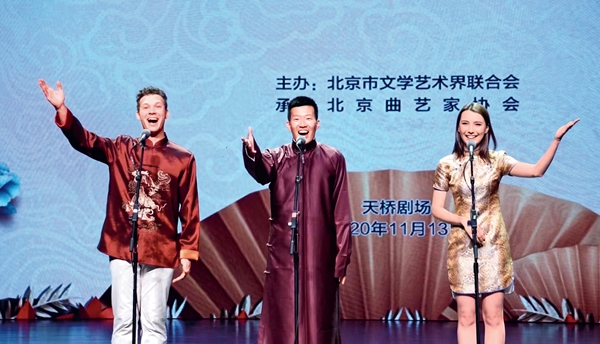
WOC: What is your understanding of the traditional performance art of crosstalk? What do you think is the most charming part of it?
Huang: In my view, the two Chinese characters in crosstalk (xiangsheng in Chinese), xiang and sheng, can be interpreted individually. Xiang means appearance, and sheng means voice. Xiangsheng, an art of language, is one of the most traditional art forms in China.
Why I like crosstalk, in particular, is it is informative and entertaining. As you listen to crosstalk, you will not only find it funny and burst out laughing, but you will also learn something from it, such as historical facts or traditional knowledge.
To be honest, I am not a professional crosstalk performer, because compared with Western talk shows, crosstalk is more difficult. Professional crosstalk performers often start practicing basic skills and learning scripts from a very young age. They have to be able to sing, imitate and perform simple movements, similar to Peking Opera, which is very difficult.
In my opinion, the most difficult part of crosstalk is also one of its charms. As a viewer, enjoying a crosstalk performance, it not only makes me laugh, but also makes me feel the performers are too powerful. I admire them, from the bottom of my heart. As a crosstalk performer, there will always be a sense of accomplishment after the performance (if the show went well).

WOC: How is crosstalk different from Western stand-up comedy? What to you is the most challenging part of performing crosstalk in China? What's your career-development plan?
Huang: Western stand-up comedy is very modern, while Chinese crosstalk is more traditional. Even the modern crosstalk, which is popular nowadays, is based on traditional techniques. There is a saying that if your basic skills are not that good, then you'll probably not be a good crosstalk performer.
The most challenging part of our performance is not how to perform, in terms of skills. I trust my partner very much, and he will make our performance a success. The most difficult thing is how to mix foreign humor with Chinese humor, so the stories (about things) that happened to us can be turned into scripts that resonate with Chinese audiences. It takes a lot of time to create a good script, and to rehearse again and again, so you can be confident on stage to finally perform for the audience.
Besides crosstalk, I also have other things to do in life, like trying to be an influencer on social media, or hosting some shows, or just being a new mom.
As a graduate in broadcasting and hosting, from Beijing-based Communication University of China, I have served as hostess for many galas and shows.
I have also participated in the filming of many programs, and I have visited many villages in China. For example, in August 2022, I followed a team of BTV to Huawu, a village in Southwest China's Guizhou Province, and I was very impressed. Huawu is a place that Chinese President Xi Jinping has been to, and I am honored to have been there too.
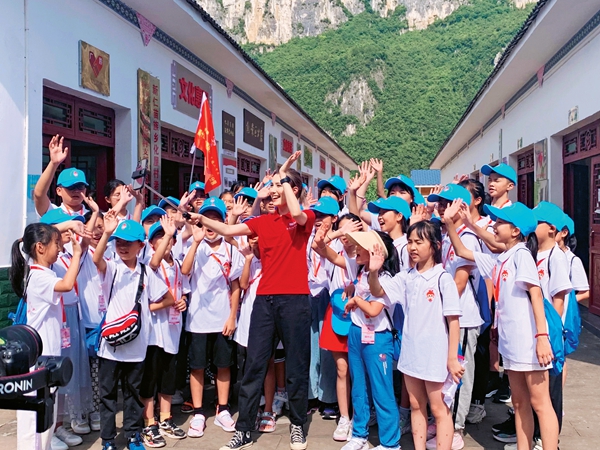
Although the village is not big, the lives of the villagers are rich and colorful. Some of them own hotels, and some of them work in the local factories. About China's new development philosophy, featuring innovative, coordinated, green, open and shared growth, I think we are on this road making progress, year by year.
Of course, Yan and I will try our best, and we will work harder to create more good crosstalk skits. But finding the balance between all those things will be my goal in 2023.
Photos Supplied by Interviewee
(Women of China English Monthly March 2023 issue)
Please understand that womenofchina.cn,a non-profit, information-communication website, cannot reach every writer before using articles and images. For copyright issues, please contact us by emailing: website@womenofchina.cn. The articles published and opinions expressed on this website represent the opinions of writers and are not necessarily shared by womenofchina.cn.

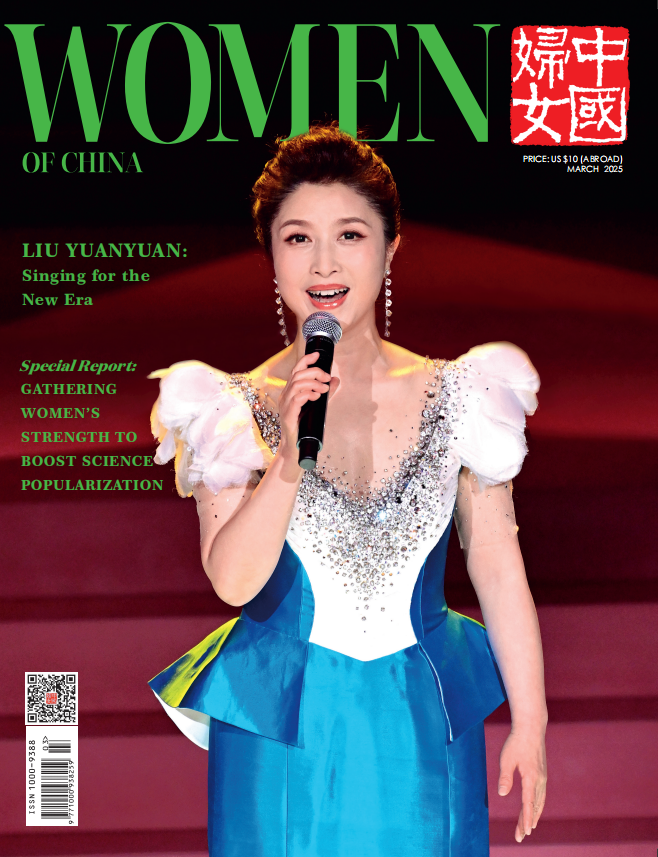




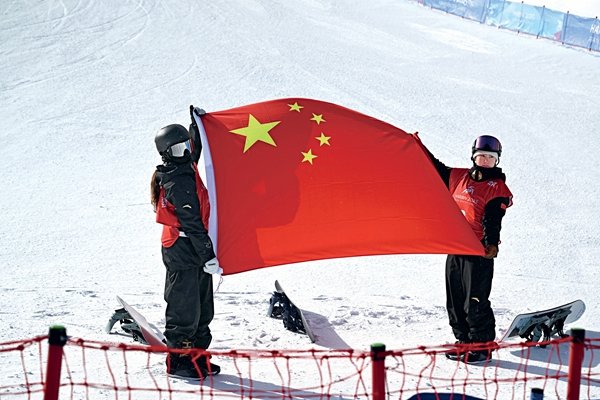
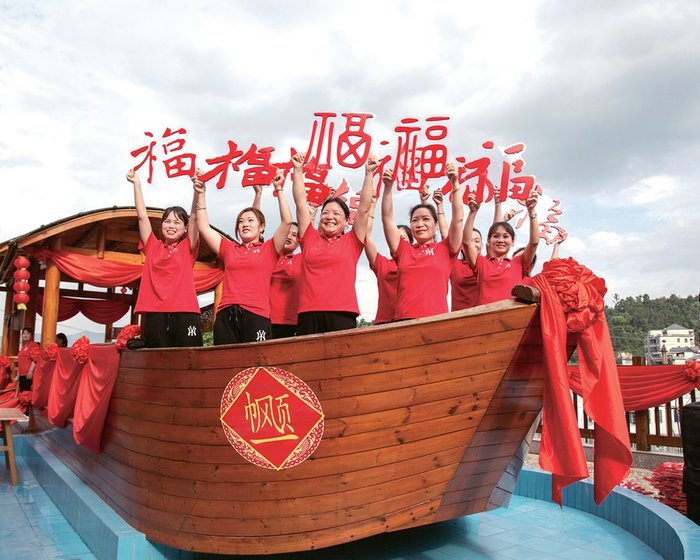
.jpg)

 WeChat
WeChat Weibo
Weibo 京公网安备 11010102004314号
京公网安备 11010102004314号